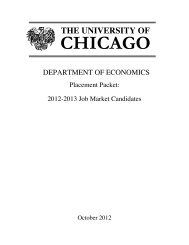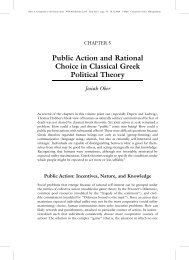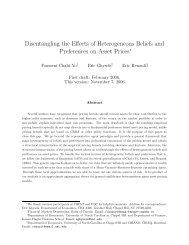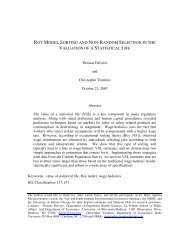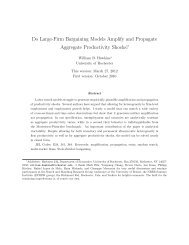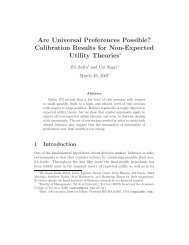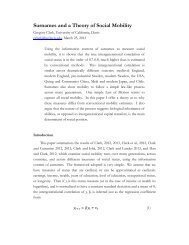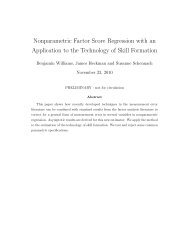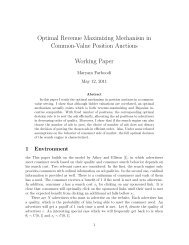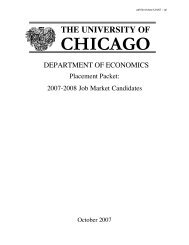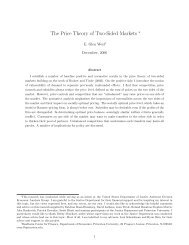CHICAGO - University of Chicago Department of Economics
CHICAGO - University of Chicago Department of Economics
CHICAGO - University of Chicago Department of Economics
You also want an ePaper? Increase the reach of your titles
YUMPU automatically turns print PDFs into web optimized ePapers that Google loves.
Francesco Nava<br />
franava@uchicago.edu<br />
5631 S. Kenwood Ave<br />
home.uchicago.edu/~franava <strong>Chicago</strong>, IL 60637<br />
Cell: 773-209-3671<br />
[US Green Card]<br />
EDUCATION PhD in <strong>Economics</strong>, <strong>University</strong> <strong>of</strong> <strong>Chicago</strong> Now<br />
MA in <strong>Economics</strong>, <strong>University</strong> <strong>of</strong> <strong>Chicago</strong> 2005<br />
Laurea in <strong>Economics</strong>, Università Bocconi, Milan, Italy 2002<br />
FIELDS<br />
Economic Theory, Contract Theory, Political Economy, IO, Money and Banking & Computational <strong>Economics</strong><br />
JOB MAKET Quantity Competition in Networked Markets: Outflow & Inflow Competition 2008<br />
PAPER This analysis investigates how economies in which trades can occur only amongst individuals that know each other<br />
operate. Two general equilibrium models <strong>of</strong> oligopolistic Cournot competition are discussed. In the first individuals<br />
choose outflows to neighbors and net-demands determine prices to clear each local markets. While in the second inflows<br />
are chosen and net-supplies clear each local market. Sufficient conditions for the existence <strong>of</strong> a pure strategy equilibrium<br />
in the flow competition models are provided. In such economies changes in flows, affect both inflow and outflow prices.<br />
Moreover price distortions do not disappear as the changes in flows vanish. Suppliers price discriminate across buyers<br />
connected to them, but compete in each local market. Flows and prices in the economy are characterized. Equilibrium<br />
retrade with positive markups occurs even if the economy is fully connected. But neighbors with different marginal rates<br />
<strong>of</strong> substitution do not necessarily trade. Adding trading relationship in such environments can reduce social welfare.<br />
Moreover increasing the set <strong>of</strong> trading partners <strong>of</strong> an individual may cause him to suffer a loss. Sufficient conditions on<br />
the connectedness <strong>of</strong> the network are provided for the networked economy to converge to a competitive outcome as it<br />
grows large. In this simple setup it is proven that resale must vanish for an economy to become competitive as it grows<br />
large, since the gross margin <strong>of</strong> retail never vanishes. Prices and flows <strong>of</strong> the limiting economy are fully characterized.<br />
SECONDARY Joint Commitment: Implementation without Public Randomization 2007<br />
PAPER This paper investigates how the ability to jointly rule out actions affects behavior in a game. If players can voluntarily<br />
sign contracts that commit them to jointly rule out some <strong>of</strong> their actions, mutually beneficial bargains can <strong>of</strong>ten be found.<br />
The set <strong>of</strong> allocations implemented if players have a single opportunity to sign contracts that deterministically rule out<br />
some actions is characterized. Because players are not allowed to sign random contracts, it may appear that such subset<br />
<strong>of</strong> contracts does not in general implement all efficient allocations. The analysis however shows that if players have<br />
sufficiently many opportunities in which to sign such deterministic contracts, any individually rational allocation is<br />
approximately implementable. Therefore the implementation <strong>of</strong> any efficient and individually rational allocation does<br />
not require any randomness in the mechanism used if players have several opportunities in which to reach an agreement.<br />
WORKING Strategic Voting in Quorum Rules with Information Disclosure: Theory & Evidence 2007<br />
PAPERS Games <strong>of</strong> Independent Commitment 2007<br />
When to Produce? Optimal Timing <strong>of</strong> Production for Durable Goods 2006<br />
Sequential Equilibria in Infinite Games 2004<br />
Public Finance and Tax Evasion: the Dynamic Effect <strong>of</strong> Public Expenditure on Evasion 2004<br />
TEACHING Auction Theory Lecturer BA 2008 & 2009<br />
EXPERIENCE Price Theory III TA PhD Myerson, Sonnenschein & Reny 2005 & 2007<br />
Price Theory TA MBA Topel 2006<br />
Price Theory II TA PhD Sonnenschein 2005<br />
Game Theory TA BA Sonnenschein 2004 & 2005<br />
SELECTED Workshop in Economic Theory, <strong>University</strong> <strong>of</strong> <strong>Chicago</strong> 2007 & 2008<br />
PRESENTATIONS Econometric Society European Summer Meeting, Università Bocconi 2008<br />
Econometric Society North American Summer Meeting, Carnegie Mellon 2008<br />
Working Group in Economic Theory, <strong>University</strong> <strong>of</strong> <strong>Chicago</strong> 2006 & 2007<br />
FELLOWSHIPS Henry Morgenthau Jr. Memorial Fund Dissertation Fellowship 2007<br />
Irwin Rosen Fellowship, <strong>University</strong> <strong>of</strong> <strong>Chicago</strong> 2006<br />
<strong>University</strong> <strong>of</strong> <strong>Chicago</strong> Scholarship 2005<br />
REFEREE Journal <strong>of</strong> Public <strong>Economics</strong> 2008<br />
LANGUAGES<br />
COMPUTER<br />
English (fluent), Italian (native), French (fluent), German (fluent), Spanish (fair)<br />
Matlab, Stata, Maple, SWP, WinEdt, Spss, LaTex, Office, Matematica (basic), Fortran (basic)<br />
REFERENCES Roger Myerson 773- 702-6576 myerson@uchicago.edu<br />
Hugo Sonnenschein 773- 834-5960 h-sonnenschein@uchicago.edu<br />
Balazs Szentes 773- 702- 9127 szentes@uchicago.edu<br />
Phil Reny 773- 702-8192 preny@uchicago.edu



